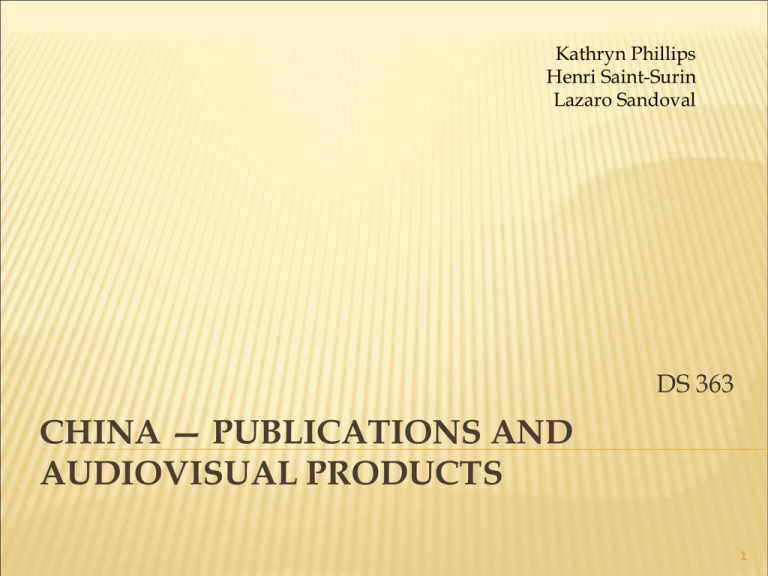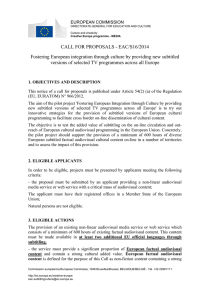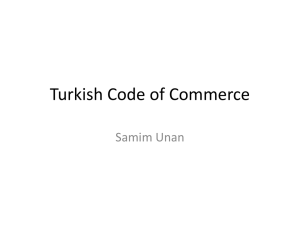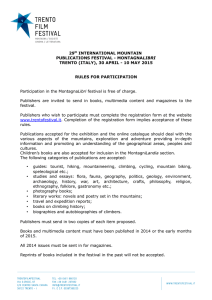DS 363 - International Trade Relations
advertisement

Kathryn Phillips Henri Saint-Surin Lazaro Sandoval DS 363 CHINA — PUBLICATIONS AND AUDIOVISUAL PRODUCTS 1 HISTORY & CONTEXT Issue: China — Measures Affecting Trading Rights and Distribution Services for Certain Publications and Audiovisual Entertainment Products Request for Consultations: April 10, 2007 Complainant: United States Respondent: China Third Parties: Australia, European Union, Japan, Korea, Chinese Taipei 2 HISTORY & CONTEXT Similar Precedents and Proceedings – • DS362 China — Measures Affecting the Protection and Enforcement of Intellectual Property Rights (Complainant: United States) • DS124 European Communities — Enforcement of Intellectual Property Rights for Motion Pictures and Television Programs (Complainant: United States) • DS86 Sweden — Measures Affecting the Enforcement of Intellectual Property Rights (Complainant: United States); • DS28 Japan — Measures Concerning Sound Recordings (Complainant: United States) 3 HISTORY & CONTEXT Issue #1 U.S. sought to reverse Chinese measures affecting the trading rights and distribution of U.S. films, audiovisual home entertainment products, sound recordings and publications. China measures reserve to certain Chinese designated and wholly or partially state-owned enterprise the right to import audiovisual entertainment products Issue #2 China measures that impose market access restrictions and discriminatory limitations on foreign service providers seeking to engage in the distribution of audiovisual entertainment products 4 VIEW OF U.S. INDUSTRY • The U.S. entertainment and “content” industry (Motion Picture Association, etc.) argued that Chinese measures were severely damaging to their economic interest in the region. • Industry sought the right to import and distribute in China on a nondiscriminatory basis. • Industry also argued the fact that China controlled which countries could import these products, raised prices and led to piracy and counterfeits 5 VIEW OF CHINESE GOVERNMENT • China claimed these restrictions where in place to “establish a content review mechanism and a system for the selection of imported cultural goods’” • China argued cultural goods have an impact on societal and individual morals and thus only approved import entities are authorized to import the relevant “cultural goods” and carry out content review at the border. 6 • • REGARDING DISTRIBUTION REGARDING TRADING RIGHTS SERVICES Measures that restrict exchange privileges with respect to imported • Certain measures that restrict films for theatrical release, market access for, or discriminate audiovisual home entertainment against, foreign suppliers of products (DVDs, videocassettes), distribution services for publications sound recordings and publications and foreign suppliers of audiovisual (books, magazines, newspapers) services for audiovisual home entertainment products. Measures at issue appear not to allow all Chinese enterprises and all • These appear to accord less foreign enterprises and individuals favorable treatment to foreign the right to import the products into suppliers of distribution services for China. Also, foreign individuals and publications than that accorded to enterprises, are accorded treatment Chinese suppliers. less favorable than that accorded to enterprises in China with respect to the right to trade. THE CONTESTED ISSUE IN DETAIL 7 AGREEMENTS AND PROVISIONS REGARDING TRADING RIGHTS • • The measures at issue are inconsistent with China's obligations under the provisions of paragraphs 1.2, 5.1 and 5.2 of Part I of the Protocol of Accession Measures are also inconsistent with China’s obligations under Article III:4 and article XI:I of the GATT 1994 8 AGREEMENTS AND PROVISIONS REGARDING TRADING RIGHTS (CONT’D) Protocol of Accession; Part I Paragraph 1.2: The WTO Agreement to which China accedes shall be the WTO Agreement as rectified, amended or otherwise modified by such legal instruments as may have entered into force before the date of accession. Paragraph 5.1: Without prejudice to China's right to regulate trade in a manner consistent with the WTO Agreement, China shall progressively liberalize the availability and scope of the right to trade. Such right to trade shall be the right to import and export goods. All such goods shall be accorded national treatment under Article III of the GATT 1994. Paragraph 5.2: All foreign individuals and enterprises, including those not invested or registered in China, shall be accorded treatment no less favorable than that accorded to enterprises in China with respect to the right to trade. 9 AGREEMENTS AND PROVISIONS REGARDING TRADING RIGHTS (CONT’D) Article III:4 of GATT 1994: The products of the territory of any contracting party imported into the territory of any other contracting party shall be accorded treatment no less favorable than that accorded to like products of national origin in respect of all laws, regulations and requirements affecting their internal sale, offering for sale, purchase, transportation, distribution or use. Article X1:1 of the GATT 1994: No prohibitions or restrictions other than duties, taxes or other charges, whether made effective through quotas, import or export licenses or other measures, shall be instituted or maintained by any contracting party on the importation of any product of the territory of any other contracting party. 10 AGREEMENTS AND PROVISIONS REGARDING DISTRIBUTION SERVICES Measures affecting publications and audiovisual home entertainment products appear to be inconsistent with China’s obligations under articles XVI and XVII of the GATS. These articles relate to Market Access for and the National Treatment of foreign suppliers 11 AGREEMENTS AND PROVISIONS REGARDING DISTRIBUTION SERVICES (CONT’D) Article XVI (1) of GATS: With regards to market access each member shall accord services and service suppliers of any other Member treatment no less favorable than that provided for under the terms, limitations and conditions agreed and specified in its Schedule. Article XVII (1) of GATS: each Member shall accord to services and service suppliers of any other Member, in respect of all measures affecting the supply of services, treatment no less favorable than that it accords to its own like services and service suppliers . 12 DECISION OF THE PANEL • China's trading rights commitments • Panel findings: China had policies that limited trade in these products • State-owned enterprises were given importation rights • Foreign-invested enterprises in China prohibited from importing • China is in breach of its Accession Working Party Report and Accession Protocol • Have to grant in a non-discretionary manner the right to trade • China appealed some of the findings relating to films and unfinished audiovisual products but the Appellate Body upheld the Panel's findings 13 DECISION OF THE PANEL • GATT Article 20.a (exceptions) Appellate Body found that China could invoke Article 20.a of GATT 1994 to justify provisions found to be inconsistent with China's trading rights commitments under its Accession Protocol and Working Party Report • Appellate Body upheld the Panel's conclusion that China had not demonstrated that the relevant provisions were "necessary" to protect public morals, and that, as a result, China had not established that these provisions were justified under Article 20.a 14 DECISION OF THE PANEL • GATS Article 16 (market access) and 17 (national treatment) • Panel decided that China's measures for distribution services for reading materials and AVHE products were inconsistent with these articles of the GATS • Appellate body held up this finding • China's measures prohibiting foreign-invested entities from engaging in the distribution of sound recordings in electronic form were inconsistent with the national treatment obligation of article 17 15 DECISION OF THE PANEL • GATT Article 3.4 (national treatment) • Panel found that certain measures for distributing imported reading materials were inconsistent with national treatment article of GATT 1994 16 IMPLEMENTATION OF RECOMMENDATIONS • • On 12 July 2010, China and the United States informed the DSB that they had agreed that the reasonable period of time for China to implement the recommendations and rulings of the DSB shall be 14 months from the date of adoption of the Appellate Body and panel reports. China made efforts to implement the rulings and recommendations of the DSB, and has completed amendments to most measures at issue, including Regulations on the Management of Publications, Regulations on the Management of Audiovisual Products, Provisions on the Administration of the Publications Market and Catalogue of Industries for Guiding Foreign Investment. 17











